Blues Reviews Aug/Sept 2016
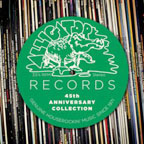 45th
Anniversary Collection
45th
Anniversary Collection
Alligator
Greatest Hits collections are a fine way to get familiar with an artist’s
work. The same can be said for a record label. Alligator has been the
gold standard for most of the past 45 years. The story has been told many
times. Young Bruce Iglauer, then an employee of Delmark, was smitten with
Hound Dog Taylor and his band and wanted to record them. Delmark honcho
Bob Koester turned him down. He had been involved with enough of the recording
of Delmark artists to get the basic idea and he launched his own company
in 1971 and recorded Taylor. 300 albums later Iglauer and company are
still going strong, still finding fresh new talent and showcasing the
work of many veterans. Iglauer writes in the liners that he wanted to
shine the spotlight on the current roster, although there are still plenty
of the classics in the mix to please everyone’s tastes. Li’l
E & The Blues Imperials open the program with their highly infectious
Hold That Train, from the 2011 album Full Tilt and the party doesn’t
let up until the Holmes Brothers close it with their amazing rendition
of Amazing Grace from 2013’s Brotherhood, their last album. In between
are equally dazzling performances by Son Seals, Marcia Ball, Koko Taylor,
Tommy Castro, Charlie Musselwhite, Shemekia Copeland, Elvin Bishop, Carey
and Lurrie Bell, Rick Estrin & The Nightcats, Joe Louis Walker, Lee
Rocker, Delbert McClinton, Anders Osborne, Mavis Staples, and the Genesis
man, Hound Dog Taylor and his Houserockers. That’s just the first
disc.
The second features James Cotton, Albert Collins on a live version of
If Trouble Was Money, Michael ‘Iron Man’ Burks, Billy Boy
Arnold, Guitar Shorty, Luther Allison, JJ Grey & Mofro, Roomful of
Blues, the great Lazy Lester, Johnny Winter doing Shake Your Moneymaker,
Curtis Salgado, Ann Rabson, Smokin’ Joe Kubek and Bnois King, A.C.
Reed and Bonnie Raitt, Luther Allison, and the Holmes Brothers. Treats,
all, to be sure, and well worth the cost of admission alone. But…intermixed
with these gems are more treats from the new bloods. Moreland and Arbuckle,
who just signed to the label, offer a fantastic Take Me With You (When
You Go) from their brand spankin’ new debut, Promised Land Or Bust,
proving why they’re one of the best trios on the road and in the
studio. Dustin Arbuckle’s strong vocals and Aaron Moreland’s
fiery guitar are buoyed by Kendall Newby’s rat-a-tat drumming. Powerhouse
guitarist Jarekus Singleton offers a look to the blues future that combines
hard rock with a classic blues story. The Kentucky Headhunters teamed
with legendary Chuck Berry pianist Johnnie Johnson on the roadhouse rockin’
Let’s Go Stumbling, a tune they cut together in 2003. Toronzo Cannon
Band’s Bad Contract is as funky and fun as it gets. Selwyn Birchwood
offers Don’t Call No Ambulance from his 2013 album of the same name.
Rockin’, but somehow subtle in the process, he’s another of
those youngsters who hold the future in his hands. And the hands seem
pretty darned competent.
This is one of those compilations that blues fans wait patiently for.
It sure won’t disappoint. The list of major players who are not
on this collection might be shorter than that for those who are. There
are many award winning performers here. Take a listen, you’ll understand
why. Great stuff.—Mark E. Gallo
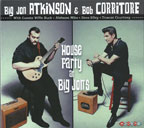 Big
Jon Atkinson & Bob Corritore
Big
Jon Atkinson & Bob Corritore
House Party at Big Jon’s
Delta Groove 2016
Over a three month period in mid-2015, young guitar slinger Jon Atkinson
and veteran blues harmonica expert Bob Corritore got together for some
jam sessions at Atkinson’s home sound studio, abetted by a roster
of notable West Coast accompanists. The result is a set of tunes primarily
exploring the Chicago blues style. Each song features lead guitar - usually
Atkinson - Danny Michel on rhythm guitar, Corritore on harp, bassist Troy
Sandow, and rotating drummers Malachi Johnson, Brian Fahey, and Marty
Dodson. There is no piano, there are no horns, and every song hews to
the twelve bar format. What the album lacks in variety it compensates
for with devotion to the Chicago genre of blues.
Of the ample sixteen tunes, three were composed by Atkinson and two by
Corritore. Of the remaining covers, “I’m Gonna Miss You Like
the Devil” and “I’m a King Bee” were penned by
J. Moore: none other than Slim Harpo. Those two Louisiana swamp blues
numbers are sung respectively by Atkinson, at the slithering, slimy pace
of Harpo’s original and by guest vocalist Willie Buck at a more
spirited tempo. “King Bee” is preceded by the set’s
only instrumental, “El Centro,” composed by Corritore and
featuring a Latinate flavor evoking memories of Charlie Musselwhite’s
many versions of “Cristo Redentor.”
Every other track is straight Chicago blues, much of it reminiscent of
the output of Rod Piazza and the Mighty Flyers and especially of the Siegel-Schwall
Band of forty years ago. Most of the tracks proceed at a mid-tempo or
meandering pace. In fact, my main caveat about the set is its lack of
juice, punctuated by a lot of rote drumming without flourishes. It isn’t
until the eighth song, “Mad About It,” that some energy and
oomph emerge, and subsequently there is only one other uptempo song. “Mad
About It” does provide tasty Atkinson-Corritore guitar-harmonica
interplay, and Corritore’s harp playing is heard on each tune, although
he is content throughout to provide support and never steps out for the
incandescent solos of which he is capable.
Atkinson’s lead guitar forays complement the songs well, without
ever attaining emotional intensity. As for vocals, he competently handles
the duty on half of the songs, providing adequate but uninspired efforts.
More compelling are the vocal contributions of Buck and additional guests
Dave Riley, Alabama Mike, and Tomcat Courtney. Riley lends his raspy voice
to “At the Meeting” and his own tune, “Mississippi Plow”
(which sounds suspiciously like “I Ain’t Supertitious”
with different lyrics) and Alabama Mike is particularly good on “Mojo
Hand,” a Lightnin’ Hopkins tune. The premier vocal of the
album is that of San Diego octogenarian Tomcat Courtney, who penned “Mojo
in My Bread” and whose cackle at the end indicates that he really
enjoyed singing it. I enjoyed it, too.—Steve Daniels
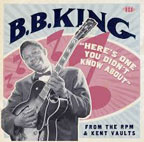 B.B.
King
B.B.
King
“Here’s One You Didn’t Know About”: From The RPM
& Kent Vaults
Ace CDTOP 1457 www.acerecords.com
B.B. King, probably the best known and most influential bluesman of them
all, was born Riley King on September 16th, 1925 in tiny Itta Bena, Mississippi.
In 1950 he signed with the West Coast’s Modern Records, who released
his first million-seller “3 O’Clock Blues”—that
remained on the R&B charts for nearly five months. It was just the
first of a long string of hits King scored over the next ten years for
the big-eared Bihari brothers—he was constantly in the studio, cutting
hundreds of sides—including major charters on the order of 1955’s
“Everyday I Have The Blues,” 1956’s “Sweet Little
Angel” and 1960’s “Sweet Sixteen.” King departed
Modern for the more mainstream ABC Records in 1961 where, beginning with
his monumental crossover smash “The Thrill Is Gone” and continuing
for the next half century, he perfected his scintillatingly dazzling guitar
technique and accompanying, majestically poignant, vocal gymnastics while
compiling an abounding and widely acclaimed discography. His “recorded
live” albums, particularly Live At The Regal, proved particularly
rewarding. But it all started with his period with Modern when he was
in his early prime. His recent passing on May, 14th 2016, at the ripe
old age of 89, prompts this fascinating vault exploration project, that
reiterates and underscores his musical mastery with 23 previously unreleased,
archival tracks (mostly from the mid-fifties) along with a pair that originally
appeared on The RPM Records Story Volume 2, also issued on Ace a few months
ago. Picks include a remarkable re-imagining of “Catfish Blues,”
a romping boogie titled “Shut Your Mouth,” alternate single
and LP versions of his classic “Sweet Little Angel,” the mid-tempo
cautionary “Be Careful With A Fool,” a jazzy nod to T-Bone
Walker on “Early In The Morning” and the swinging tribute
to a “Whole Lotta Meat,” a steamy novelty number. A nifty
companion to P-Vine’s also recent 17 CD Modern box set. Plus, producers
Roger Armstrong and Dick Shurman (who also wrote the informative, photo-studded
liners) are confident that there’s enough more unissued or obscure
takes for “a couple more good future compilations.” Can’t
wait!—Gary von Tersch
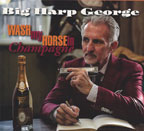 Big
Harp George
Big
Harp George
Wash My Horse in Champagne
Blue Mountain Records 2016
The first advice given to aspiring short story writers: the opening sentence
has to grab the reader. Well, before I even listened to this CD, I was
snared by the title. After actually listening to it…well, top-notch!
Recently retired law professor and public defender George Bisharat indeed
plays big harps, i.e., chromatic rather than diatonic harmonicas. Not
many contemporary harmonica mavens prefer them (although Rod Piazza frequently
employs one in his shows). Here Bisharat deploys the chromatic in twelve
of the thirteen original tunes comprising “Wash…,” fully
utilizing its versatility as an adept instrument for both jazz and blues.
He is backed by basically the same array of talented San Francisco Bay
Area musicians that appeared on his 2015 debut album, “Chromaticism”:
Chris Burns on keyboards, Raja Kawar on drums, Little Charlie Baty on
guitar, and Michael Peloquin on saxophone. Rusty Zinn’s guitar offerings
are gone, but Kedar Roy on bass, Mike Rinta on trombone, J. Hansen on
percussion, and Loralee Christensen are welcome additions. The ensemble
is anchored by Kid Andersen on alternate bass and lead guitar, whose Greaseland
Studios recorded the album. Production values are excellent; the mix is
clear and each instrument easily audible.
The musicianship is high quality. Andersen shines on bass, and when providing
lead he confirms the artistry that has earned him four Blues Music Award
nominations as guitarist of the year. Little Charlie’s offerings
are equally impressive, with more of a jazzy inflection. Big George’s
harmonica renderings are tasteful, with full, mellow tone, and his vocals,
although failing to wring maximum emotion from the few slower tunes such
as the lament “My Bright Future,” nonetheless evince nice
range and true pitch. His vocals meld beautifully with Christensen on
five tracks, including one of the album’s highlights, the title
track, a risible tale of vowed revenge.
Another highlight is “Light from Darkness,” a paean to human
altruism, with scintillating Andersen guitar licks. “Mojo Waltz”
and “Size Matters” are the two instrumentals, and “What’s
Big?” deftly displays diatonic harp prowess. In fact, almost every
song is laudable, particularly the lyrics; “If Only,” a blues
rocker, features “If only I could hold my liquor, If only I could
shut my mouth, I wouldn’t be sleeping on your sofa, With my marriage
heading south.” Eclectic themes include a dirge for a deceased lover,
a revisionist view of masculinity, and a plea for social justice.
Having left the practice of law, Big Harp George has established a well
earned place in the world of contemporary blues.—Steve Daniels
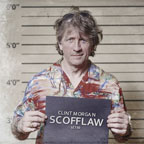 Clint
Morgan
Clint
Morgan
Scofflaw
Lost Cause CD
www.lostcauserecords.com
Accomplished blues and boogie-woogie piano player, singer/songwriter (and
lawyer) Clint Morgan was raised on a farm in rural Washington state. His
family, originally from southern Appalachia, emigrated west ‘back
in the day’ when land was cheap and the farming and logging was
productive. His great-great aunt was Eliza Morgan Bays, AP Carter’s
great grandma, and his paternal grandmother was related to the Carter
Family by marriage. This sophomore album of mostly original material
follows 2008’s You’re Really Bugging Me Now and is a highly
atmospheric concept affair of sorts with 18 tales of ruin and redemption
that off-handedly comment reflectively while proffering a variety of viewpoints
on the tortured, scofflawing protagonist (see cover)— all book-ended
and blessed by the Abingdon, Alabama Children’s Choir’s transfixing
version of the traditional affirmation “This Little Light Of Mine.”
Other folks that lend Morgan a hand include Maria Muldaur, on a couple
of gospel-charged, Muldaurishly inspirational titles (“Softly And
Tenderly” and “I Done Made It Up In My Mind”) as well
as commanding blues vocalist Diunna Greenleaf (on the wrenching “I
Don’t Know Where To Turn” and a cover of Bessie Smith’s
plea to “Send Me To The ‘Lectric Chair”) and a first-call
band that includes multi-instrumentalist Jim Hoke, Johnny Cash’s
bassist Dave Roe and Marty Stuart’s guitarist Kenny Vaughan.
Particularly well-wrought Morgan titles include an homage to Billy the
Kid titled “I Got A Gun,” a mesmerizing “D.B. Cooper
Blues,” the bank-robbing “Bad Man Blues” and “The
Face In The Mirror,” about the ill-fated dentist Doc Holliday. Also
noted: a great take on Dylan’s visionary “Wanted Man.”
Rootsy Americana music at its most accomplished. My old buddy, the Wheelchair
Man, is smiling somewhere.—Gary von Tersch
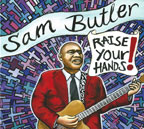 Sam
Butler
Sam
Butler
Raise Your Hands”
Severn 2015
This debut album by the talented singer and guitarist Sam Butler (Jr.)
signals his emergence from a musical limbo. Son of Sam Butler Sr., a musician
and preacher, Sam Jr. was a prominent member of the famed gospel group
the Blind Boys of Alabama, serving as guitarist for the group from 1972
to 1994. Subsequently on various ventures he has accompanied Keith Richards
and Donald Fagen of Steely Dan, among others, and here he joins forces
with pedal steel guitarist Roosevelt Collier, Viktor Krauss on bass, and
percussionist Marco Giovino. Butler handles the vocals and guitar leads
as the quartet covers a dozen songs by multiple eminent songwriters.
Not a pure blues album, this outing more accurately could be called an
amalgam of rock, gospel, and soul, all propelled by Butler’s evocative
vocals. Among the songs covered are compositions by Johnny Cash, Tom Waits,
Eliza Gilkyson, and Bruce Springsteen. Nick Cave also makes the cut, as
does Van Morrison - not surprisingly, since much of Morrison’s work
evinces the spirituality intrinsic to Butler’s background and strength.
Fittingly, the Morrison tune, “Full Force Gale,” gets the
longest treatment of the set, over six minutes, and one of Butler’s
best vocal performances. He is capable of imploring, raspy power, but
also smooth soulful crooning, as exemplified on this track.
Some of the more up tempo numbers succumb to instrumental bombast, reducing
the poignancy and impact of this set of devotional interpretations. It’s
on the slower numbers that the quartet hits its peak. Particularly notable
is the cover rendition of Eric Clapton’s [“In the] Presence
of the Lord,” which appeared on the eponymous “Blind Faith”
album of four decades ago. Blind Faith’s version, with Clapton’s
soaring guitar and Steve Winwood’s soulful tenor vocal, was itself
inspirational. Butler’s take slows the tempo and replaces Winwood’s
organ with Collier’s pedal steel; it’s a worthy and moving
version despite some excessive Butler guitar flourishes toward the end.
—Steve Daniels
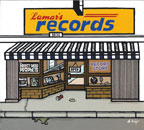 The
Mighty Mojo Prophets
The
Mighty Mojo Prophets
Record Store
Mojo King Music 2016
You don’t even have to go to a bar to hear one of the best bar bands
around. On this, their third album, the Long Beach, CA-based Mighty Mojo
Prophets build on their prior release, 2013’s “Flyin’
Home from Memphis,” with thirteen original compositions that will
set your hands a-clappin’ and feet a-dancin’.
Since their eponymously named first release in 2011, this band has been
led by vocalist Tom “Big Son” Eliff and guitarist Mitch “Da
Switch” Dow. Mike Malone remains at the keyboards since “Flyin’
Home,” with Dave Deforest now plucking the bass and Al Ricci beating
the drums, augmented by Tom Richmond on diatonic and chromatic harmonicas.
Horns have been eliminated since 2013, but they aren’t missed as
this tight ensemble digs into some gut-bucket West Coast blues.
The album blasts off with one of its best tracks, “Crazy Love,”
a madcap rocking blues that reminds me of one of my favorite California
electric blues numbers ever, “Icepick’s Confession”
from James Harman’s 1990s album “Do Not Disturb.” The
rhythm section backs a cascade of Dow’s nasty guitar licks, and
Richmond delivers a virtuoso harp solo midway through. The party is already
in full swing!
“Record Store,” the ensuing title track, is in my opinion
the only misstep of the set, relying too heavily on an overused guitar
wah-wah pedal. However, redemption is quickly achieved with “Devil
at Your Door,” another highlight, which establishes the basic mid-tempo
swagger and grit of virtually ever other cut on the disc.
Some other favorites: “Cherry Red” and “Bring It on
Home” each establish an irresistible groove; the penultimate “Wondering”
has some really greasy guitar by Dow and another fine harmonica display
by Richmond; and the only instrumental, the closing “All Thumbs,”
allows Richmond to wail on the chromatic. That said, the cynosure of the
album is Eliff’s singing: the man has great intonation, good range,
and a subtle drawl perfect for this band’s songs.
“Record Store” follows in the tradition of other notable Southern
CA blues bands of the last few decades such as the Hollywood Fats Band,
Rod Piazza and the Mighty Flyers, and William Clarke’s and James
Harman’s bands, and deserves to be mentioned in the same pantheon.
The Mighty Mojo Prophets aren’t flashy, but they deliver the goods.—Steve
Daniels
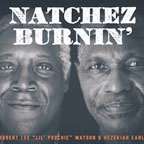 Robert
Lee “Lil Poochie” Watson & Hezekiah Early
Robert
Lee “Lil Poochie” Watson & Hezekiah Early
Natchez Burnin’
Broke & Hungry CD 13012 www.brokeandhungryrecords.com
Hats off to Broke & Hungry label honcho Jeff Konkel for keeping those
rootsy, real and raw Mississippi country blues vibrations alive with splendidly
produced projects like Natchez Burnin’ that, to great effect, links
up the veteran juke-joint duo of force-of-nature vocalist and tenacious
guitarist Robert Lee “Lil’ Poochie” Watson with Hezekiah
Early—who also sings some and shines on drums, harmonica as well
as on his marvelous, one-of-a-kind “homemade guitar” for a
couple of starkly supple and harrowing solo titles—the traditional
chestnut popularized by Big Joe Williams, “Baby Please Don’t
Go,” and Louis Jordan’s worrying “Somebody Changed The
Lock.” As producer Konkel avers in his informative liners, “these
are uneasy times for the Mississippi blues. In the past few years, we’ve
lost some of the state’s best and most-loved blues artists (many
of whom live on a series of documentaries he helped produce) and, sadly,
the trend shows no sign of slowing in 2016. In the first two months of
this year alone our dear friends L.C. Ulmer and Elmo Williams have passed.
It’s enough to drive a blues fan to drink.” Not to worry while
Watson and Early are still standing—all twelve tracks here were
laid down at a single three-hour session at the legendary Delta Music
Institute’s Studio B in Cleveland, Mississippi and reveal a wide
spectrum of influences, encompassing not only pre-war Delta blues, New
Orleans R&B, electric juke blues, nascent rock & roll and the
deepest southern soul. Picks are many, including vivid, in-the-moment
redos of material by the ill-fated Chuck Willis (“I Feel So Bad”),
Big Joe Turner (“Flip, Flop And Fly”), Fats Domino (“My
Girl Josephine”) and Lightnin’ Hopkins’ ever-timely
“Mr. Charlie” along with a pair of Watson originals (“Got
My Eyes on You” and the harp-studded “Mama Don’t Love
Papa”) and Early’s minimalist “Shooby Dooby Doo”
(with apologies to Roy Orbison). Treat yourself and also check out a 2011
documentary called We Juke Up In Here (jointly produced with Roger Stolle’s
Cat Head Delta Blues & Folk Art concern) that showcases Poochie and
Hez in all their glory, tackling material by everyone from Howlin’
Wolf to Z.Z. Hill live at Clarksdale, Mississippi’s fabled Red’s
Lounge. More please.—Gary von Tersch
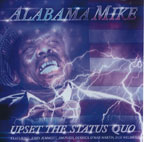 Alabama
Mike
Alabama
Mike
Upset the Status Quo
Self-produced 2016
Conundrum. Dichotomy. Paradigm.
When is the last time that you heard those words, or ones like them, in
a blues song? Well, there they are in the title track of Alabama Mike’s
latest CD, and their presence attests to the literacy as well as topical
relevance of his songs. Oh, by the way, the music is pretty darn good,
too.
Michael Benjamin released his first CD, “Day to Day,” in 2010,
with support from such blues luminaries as guitarist Steve Freund and
harmonicats RJ Mischo and John Nemeth. His 2011 follow-up, “Tailor
Made Blues,” drew on his gospel roots and love of the blues and
was highly praised, earning him San Francisco Bay Area music awards and
Blues Music Award nominations from the Blues Foundation. His next foray
was an acoustic side project with harmonica player Scott Brenton and guitarist
Anthony Paule, calling themselves the Hound Kings, on an album entitled
“Unleashed.”
Now Mike has corralled a group of the best Bay Area blues artists to support
this latest effort. Recorded in Kid Andersen’s highly regarded Greaseland
Records studio, the set features Andersen, Jon Lawton, and Bob Welsh on
guitars, Andersen and former Robert Cray sideman Jim Pugh on organ, Welsh
and Sid Morris on piano, and rising ace Aki Kumar on harmonica, backed
by a rotating rhythm section and occasional contributions by Bernard Anderson
on saxophone. With this kind of quality, it’s hard to go wrong.
Mike has a raspy tenor which he deploys effectively. The first four tracks,
all mid-tempo, are distinguished by Welsh’s guitar licks, Pugh’s
swirling organ interventions, and Kumar’s tasteful harp. “Can’t
Stay Here Long” slows the pace, with Mike’s imploring soul
vocal. Next, his slow anguished vocal intro segues into the uptempo “Fight
for Your Love.”
“Rock Me in Your Arms,” written by Lawton, presents Mike in
Van Morrison mode, which is intended as high praise. “SSI Blues”
is introduced by Kumar’s driving harp; only the song’s clever
lyrics distinguish it from the Paul Butterfield Blues Band’s version
of “Walkin’ Blues” from their classic album “East-West.”
Mike then both croons and shouts on the Little Johnny Taylor tune “Somewhere
Down the Line,” and the set ends with “God Is with You,”
leading us back to church with the assistance of back-up singers Loralee
Christensen and Lisa Andersen.
With its clear sound, inventive songs, and musical artistry, this CD furthers
Alabama Mike’s soul and blues credentials.—Steve Daniels
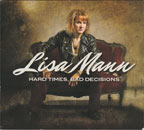 Lisa
Mann
Lisa
Mann
Hard Times, Bad Decisions
www.lisamannmusic.com
Miss Lisa Mann has been a standout from the start; this young lady is
really the complete package. At first you may notice her looks but you
can’t overlook this demure woman’s thunderous bass playing
and stage presence. She’s been recognized for her work winning the
Blues Music Award for bass two years in a row. I’ve always felt
a good bass player is the backbone of a song and as bandleader Miss Mann’s
bass drives both the melody and the rhythm. But with any group it’s
the vocals and songs that make or break a band, and she’s got that
covered too. Lisa co-produced this recording but of course no one can
do it all and her band featuring guitarist Jason Thomas, Michael Ballash
on drums and Brian Harris on keys assist Miss Mann in this endeavor.
Starting with a roar, Lisa’s throaty growl powers the band through
what sounds like a true tale of “Hard Times, Bad Decisions”
with the guitar & organ coming in hard. Lisa is redeemed from those
times by a “Certain Kinda Man” with a soulful old school Motown-flavored
organ and rhythm guitar, dedicated to her own man. “You Need A Woman”
is a bouncy jump number with Alex Shakeri on piano, Lisa’s vocal
a swaggering swing leading to “I Go Zoom” with Alex playing
rockabilly boogie piano and Sonny Hess on lead guitar to a rough rockabilly
number called “Doghouse.” Kirk Fletcher’s guitar is
featured on the gospel infused number “My Fathers House” while
“Ain’t Nunna Yo Bizness” is a revival tent throw down
with a touch of New Orleans for good measure. A trio of covers follows:
“I Don’t Hurt Anymore” has a touch of Patsy Cline in
this country tinged ballad with organ replacing pedal steel guitar; “I
Love You All the Time” a piano-led piece of peppy pop with French
lyrics that would fit in the Brill building cannon and “Play It
All the Way” with guitar blasting some Chuck Berry riffs. With a
Mississippi hill country sound Miss Mann is joined by Blues Music Award
winner for Best Guitarist Ben Rice and the unlikely percussion of well
known rock and heavy metal drummer Vinny Appice as Lisa sings “Judge
a Man Forever” “by the worst thing he’s ever done.”
For a real change of pace Mann added saxophonist Renato Caranto to the
mix for “Two Halves of One Broken Heart” a soulful ballad
featuring a duet with Andy Stokes, a Northwestern soul monster.
Lisa Mann is taking charge with “Hard Times, Bad Decisions”
her fourth recording in six years and leaving those times and decisions
in her wake.—Roger & Margaret White
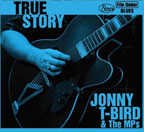 Jonny
T-Bird & the MPs
Jonny
T-Bird & the MPs
True Story
Neon Grub Jeer
Successful bands, whether on the international circuit or at the corner
bar, are those that are democratic. One of the players will have his or
her name on the top of the marquee, but it just wouldn’t work if
they weren’t all propping each other up. Jonny T-Bird and his band,
the MPs (a reference to a band from the past) are subscribers to the concept
of being all in it together. A tight-knit band with a lot of road miles,
Johnny and the fellas are a straight up blues band with a flair for flash.
On Undercover Lover Ben Hans sets up a nice groove over which ‘Big
Dad’ Robert Keelan blows harp and Jonny sings that it just might
be time for him to go undercover. T-Bird then adds some tasty guitar licks
while Danny Moore plays percussive piano and the band sings a responsive
background. Johnny shares vocals with Queenie McCarter on the dialogue
of We Got It. Keelan takes a stab at vocalizing on Storybook Blues, a
song that opens with Jonny talking to the make believe audience of kids
telling them it’s storybook time and introducing Big Dad to them.
Keelan then opens with “it was the best of times/it was the worst
of times.” Good to know the “kids” are getting exposed
to the classics. The 3 Little Bears gets woven into the strange story,
too, while Johnny shreds on the guitar. Nice keys by Keshena Armon, too.
More of the tasty guitar frames Comes & Gone a song that has Jonny
wondering what he done wrong. She’s The Toast of the Town opens
with an infectious rat-a-tat percussive beat over which T-Bird adds a
slinky guitar. Perhaps the most impressive guitar work is on Misunderstandings,
with a jazzy underpinning. The band is anchored throughout by Brian “Bmo”
Morrison. Marcus “MG” Gibbons shares drum duties with Hans
and Rob Price shares the keyboards with Armon and the very impressive
Danny Moore. Cass Stuve (saxophones) and Wayne Groth (trumpet) add on-time
sass here and there and Max Jones adds percussion. Clearly Jonny T-Bird
gets the front and center, but it takes a band to raise a groove. —Mark
Gallo
 Chaz
DePaolo
Chaz
DePaolo
Resolution Blues: An Acoustic Blues Journey
Smoke Tone Records www.smoketonerecords.com
Chaz DePaolo has always been a man of resolve, coming from a family steeped
in the entertainment world, guitar playing was second nature till a hand
injury sidelined him in his early twenties. But through will and determination
he retaught himself to play and he climbed to new heights filling arenas
with the British blues/rock band the Groundhogs. But the toll one pays
on a musical journey can be costly and Chaz had to overcome new hurdles
including alcoholism and homelessness to find his way forward. Through
perseverance he’s continues to pour himself into his music and recently
was awarded a spot in the New York State Blues Hall of Fame. That fortitude
brings us to DePaolo’s latest release “Resolution Blues: An
Acoustic Blues Journey.” He’s helped by Prestine Allen on
piano, Clifford McComas on drums, bassist Hank Kaneshige, Robert Chaseman
on saxophone and David Biondo on harmonica and while Chaz plays acoustic
guitar this band is not playing your usual back porch blues but has an
improvisational jazz sound that is not what you’d expect at first
glance.
Leading off with a jazzy number featuring a sultry sax, snappy piano and
shuffling beat Chaz declares “A Love So Strong” “can
not be broken.” Slowing down with a bouncy twang “Resolution
Blues” speaks of New Year resolutions, past relations, hopes of
a brighter future and what that would entail. With an upbeat chugging
rhythm and a light jazzy feel, band members seem to improvise their parts
adding layers to these “Broken Tales.” Written on a mountain
top at 2am, “Angel On My Shoulder” leads off with an airy
harmonica as Chaz looks into his past. With a slow stroll and staccato
guitar Chaz resolves it’s time to move on in “I’m Not
Angry Anymore.” Sounding like a classic “Route 66” “Rearview
Mirror” refers to your old life and its problems, don’t look
back keep movin’ on ahead.
A moaning sax calls to “Love’s Resistance” against a
cocktail piano till that sax roars in with a mournful wail as the organ
cuts through “Scars” and its emotional wounds cut deep. DePaolo
pays tribute to Robert Johnson with “Gunther 414,” the Gunther
hotel is where the majority of Johnson’s music was recorded in San
Antonio Texas, November of 1936, and has influenced generations of blues
players. A solo acoustic guitar churns under the whooping vocal, as Chaz
can “Share” with others but he has to be true to himself.
Chaz DePaolo’s been to the rarefied heights of music and fallen
to the lows of life but his “Resolution Blues: An Acoustic Blues
Journey” may be his own redemption.—Roger & Margaret White
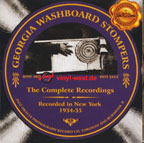
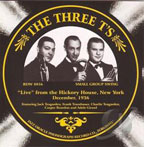 Georgia Washboard Stompers
Georgia Washboard Stompers
The Complete Recordings: Recorded In New York 1934-35
Jazz Oracle CD 8036
www.jazzoracle.com
The Three T’s
Live From The Hickory House
Jazz Oracle CD 8056
I’ve been unfamiliar with Canada’s Jazz Oracle label until
recently. Helmed by bewhiskered John R.T. Davies, the foremost vintage
audio engineer in the world, the oracular concern specializes in reissuing
often unjustly long-forgotten jazz, hot dance and personality recordings
from the 1920s and 1930s with informative booklets containing complete
discographical info along with an abundance of pictorial ephemera. This
pair of recent titles piqued my interest—I’d never heard of
the Georgia Washboard Stompers and have long been a fan of trombonist/vocalist
Jack Teagarden. Bands that featured a washboard began as a South Side
of Chicago “happening” in the mid-1920s with a combo led by
Jimmie O’ Bryant, whose unexpected commercial success led to a slew
of other Windy City sides, issued by competitors, on a variety of small
local labels—aside from Bryant’s unit (alternately the Wizards,
Owls or Ragamuffins) there were the Chicago Footwarmers, the Dixie Four
and the Dixieland Thumpers, among many others. Incredibly, for whatever
reason, as the Depression became a grim reality in the early 1930s, a
brand new crop of washboard-fronted bands appeared and were extensively
recorded by the major labels—most notably the Georgia Washboard
Stompers on newly-formed Decca Records. These sides, from an extremely
productive pair of sessions, were among the first shellac 78’s issued
on Decca’s 7000 “race” series. Often featuring the enervating,
broad-toned trumpet work of a youthful Taft Jordan (who, by the mid 1940s,
was in Duke Ellington’s band), the Stompers particularly shine on
inspired “hot novelty” efforts on the order of “I Can’t
Dance (I’ve Got Ants In My Pants”), “Who Broke The Lock
On The Hen House Door” and “Lulu’s Back In Town”
as well as on two renditions of a trio of chestnuts (“Tiger Rag,”
“Alexander’s Ragtime Band” and “Limehouse Blues”)
and lots of woe-be-goners like “Farewell Blues,” “After
You’ve Gone” and “Chasing Shadows.” Moving ahead
a couple of years we are next treated to a great-sounding compilation
of material from three “live” NBC network radio broadcasts
originating from New York’s fabled, West 52nd Street Hickory House
night club from December of 1936—the last, and liveliest, dates
from December 25th, 1936. The “Three T’s” reference
the “small group” swing trio of saxophonist/arranger Frank
Trumbauer, trumpeter Charlie Teagarden and his brother, the inimitable,
Jack Teagarden, who were all “on holiday leave” from Paul
Whiteman’s popular jazz orchestra. Throughout, the small combo swings
fluently in a chemistry-rich, modernistic Dixieland manner without relying
on the vintage chestnuts commonly performed by such pick-up aggregations.
Favorites are plentiful and include obviously improvised numbers like
“I’m An Old Cowhand,” “Ode To A Chimney Sweep”
and “Liza” along with six pleasurably swinging medley numbers
(particularly, the pair from the film Gold Diggers Of 1937), nifty takes
on another pair of currently popular songs (“I’ve Got You
Under My Skin” and “S’Wonderful”) as well as a
couple of reflective highlights from the Christmas date—”Way
Down Yonder In New Orleans” and “Christmas Night In Harlem.”
The inclusion of a variety of NBC radio station ID’s,”themes
and openings” and “closing announcements” as well as
a live “news bulletin” about the abdication from the English
throne by King Edward VIII because of his “association” with
his American lover Wallis Simpson. This sounds like the kind of adventurous
music that may have inspired them!—Gary von Tersch
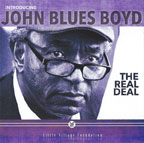 John
Blues Boyd
John
Blues Boyd
The Real Deal
Little Village Foundation 2016
Since leaving his long association with the Robert Cray Band (and prior
impressive engagements), organ player Jim Pugh has founded the Little
Village Foundation, based in Central California’s Santa Ynez Valley,
to discover or resurrect and then to present otherwise under-recognized
musical talent. Last year’s album by singer Wee Willie Walker was
a notable success. Now Pugh, with the assistance of famed harmonica player,
composer, and songwriter Rick Estrin and producer and multi-instrumentalist
Kid Andersen, reprises the Walker experiment with Boyd. Cousin of the
late bluesman Eddie Boyd, John Blues delivers the goods.
Sporting the pristine recording values of Andersen’s Greaseland
Studios, the album also calls on the skills of an array of California
- mainly San Francisco Bay Area - musicians, roughly the same ensemble
that contributed to a recently released CD by Alabama Mike. Included are
guitarists Andersen, Bob Welsh, and Big Jon Atkinson, keyboardist Pugh,
harmonicats Estrin and Aki Kumar, saxophonist Terry Hanck, and almost
a dozen other adepts. (Unfortunately, the sparse liner notes fail to delineate
the performers on specific tracks.)
The musicianship is of the expected high quality, as are the songs. Of
the thirteen cuts, Boyd penned ten. Estrin is responsible for “I
Am the Real Deal,” the opener, and “That’s Big,”
a jocular horn-driven number, with Estrin’s usual lyrical humor,
extolling the ample physical charms of a desired woman. Estrin and Andersen
co-wrote “Dona Mae,” written in tribute to Boyd’s wife
of almost 50 years, who died in 2014. The slow number features Boyd’s
moving vocal and the poignant refrain, “I loved you when we were
school kids/And I love you when we’re old and gray.”
Other highlights include “When Your Eyes Met Mine,” a mid-tempo
soul track about true love at first sight which is reminiscent of Little
Milton’s best, and “The Smoking Pig,” whose dubious
title is redeemed by the piano- and guitar-driven testimonial to a favored
Oakland, CA, barbecue joint. The album closes with “John, the Blues
Is Calling You,” this time effectively evoking the style of T-Bone
Walker and Pee Wee Crayton.
Not credited with playing an instrument, Boyd asserts his worth with fine
singing throughout. His generally smooth delivery is made unique by the
occasional rasps, warbles, and unanticipated intonations that he throws
in. At seventy years young, Boyd confirms his right to be heard.—Steve
Daniels
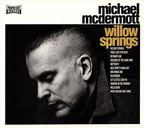 Michael
Mcdermott
Michael
Mcdermott
Willow Springs
Pauper Sky Records CD www.michael-mcdermott.com
Barely twenty years old, folk-rocking singer-songwriter Michael McDermott
began performing in Chicago coffeehouses and bars in the early 1990s,
fluidly incorporating elements of Irish music into his acoustic roots-rock
sound and impressing all the critics with his notable, all-originals debut
album 620 W. Surf. McDermott’s accomplished, introspective songwriting
and earnestly passionate Dylan/Springsteen-informed vocal approach led
folks to tout him as Rock’s next “big thing” but the
record industry’s collapse in the early 1990s, coupled with personal
missteps and failures on his part, effectively short-circuited his career—nonetheless,
he somehow managed to release eight catch-’em-if-you-can projects
over the ensuing years before this recent, stunning homage to the small
Illinois town he now lives in with his wife and daughter. Recorded at
his backwoods home and fan-funded, McDermott not only produces affairs
but has enlisted a stellar group of supporting musicians, including Will
Kimbrough, John Deaderick and his wife, Heather Horton, on a dozen transfixing
originals. Titles like the poignant title track, the observational “Getaway
Car” and “Folksinger” and the downbeat “Half Empty
Kinda Guy” and “Shadow In The Window” conjure a timeless
depth of life and emotional survival not often heard these days. Other
deeply illuminating, imagistic reflections on the human condition include
“What Dreams May Come” and “Soldiers Of The Same War.”
His best in years.—Gary von Tersch
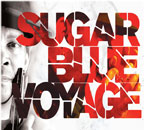 Sugar
Blue
Sugar
Blue
Voyage
Sugar Blue’s first new music in years does not disappoint. Fat-toned
harmonica shares space with his captivating vocals. From the lyrical On
My Way (Sarah’s Song) to the rockin’ out closer, Time, this
is wall to wall spectacular. Sugar Blue (born James Whiting) came to wide
recognition in the 1970s when he recorded with the Rolling Stones, most
recognizably on their monster hit Miss You. But he had been at it for
years before that, having recorded with Brownie McGhee, Victoria Spivey
and others. When he returned home to Chicago from Paris he sat in with
the classic harpers like James Cotton, Carey Bell and Junior Wells whenever
he could. He joined Willie Dixon’s Chicago Blues All-Stars, completing
his graduate school in the blues. Now he’s the professor. Class
is in session. On the 12 song program are 10 from his pen. Ironically,
Sugar Blue Boogie, written by guitarist Rico McFarland, bassist Ilaria
Lantieri and drummer Brady Williams, is one that he did not have a hand
in writing. It’s as on fire as a harmonica can be, driven like a
locomotive. It also lets the others take a turn and everyone on the train
is stellar. The other cover, Ray Charles’ Mary Ann spotlights his
vocals and his diversity. Damiano Della Torre’s piano is dead on.
The original material, however, is where Blue shines. His command of the
instrument is apparent. He cajoles and cons and uses every available inch
of it. His work on One, for instance, is breathtaking. He sings “One
man’s future is another man’s past” while the band comps
and he takes the harp to the stratosphere. On New York City he revisits
his roots in a 1920s style rag, replete with the sound of vinyl scratches.
On Mercedes Benz he trades deep licks with guest star Eddie Shaw on saxophone
to great effect. Sunshine has that light and bright crisp feel to it,
reminiscent of Lee Oskar. This and the opener, On My Way, are the heart
of the disc. These are the nuance songs. Life on the Run addresses life
in the city and asks “What right have you to shoot an innocent down?”
He shares vocals with the powerful Maya Azucena on the most lyrically
powerful song in the set. Like Muhammad Ali Sugar Blue floats like a butterfly
and stings like a bee. This is a monumental recording. —Mark E.
Gallo
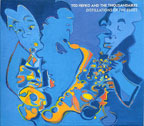 Ted
Hefko
Ted
Hefko
and the Thousandaires
Distillations of the Blues
Self-released
When I was in the 9th grade, about 50 years ago, I played clarinet in
the school band. I’ve regretted letting it go ever since. The clarinet
has a gorgeous woody sound unlike anything else. Ted Hefko is a master
of the instrument. These ‘distillations’ are based around
the jazzy side of blues and the bluesy side of jazz. Opening with the
deliciously naughty Hesitation Blues, Hefko sings, “I ain’t
no miller/and I ain’t no miller’s son/but I can do all your
grinding/until the real miller comes” while adding his clarinet
stylings in tandem with Kid Chocolate’s trumpet, Brian Vinson’s
upright bass and Norman Edward, Jr.’s drums. A classic song getting
one of the most impressive readings this listener has ever heard. I Don’t
Feel Welcome Here “is a blues with clarinet, electric guitar and
the crew. “It hurts me/and I know it hurts you too/but you can’t
keep saying things that you know aren’t true” point to his
proficiency as a lyricist. Hefko switches to a lanky tenor sax for I’ve
Got A Right To Carry On is a hipster tale about being his own man (“I’m
what the cat dragged in/I’m what the chef threw out/I’m rotten
and I’m evil/and I make you jump and shout/I’m not fooling
with you dear/or trying to turn you round.” Clever stuff. Champion
Jack is an instrumental with an Art Blakey motif that lets the horn players
take front and center. The title cut has a breezy almost Jimmy Buffet
feel to it, but don’t let that scare you away. It’s an acoustic
number that adds to the delight of the disc. Slippin Slowly showcases
Hefko’s acoustic guitar work and points to more of that sly songwriting.
“She was just my size/she had a swivel in her hips/ and the devil
in her eyes/I slipped so slow that before I knew/every song that I wrote
was comin’ out blues.” Andy ‘Dr. Bone’ Galbiati’s
dangerous plunger trombone is a treat here. Bad Kids (“stealin’
wallets and 10-speed bikes”) is a finger snapper that might have
worked for Rickie Lee Jones, while Butterfly Dreamin’ could have
been a hit for Hoagy Carmichael. The closing When The Weather Breaks has
a sweet horn chart that takes us to the beach. This is one of the surprises
of the month for sure. Blues distilled. Blues redefined. Lyrically and
musically a treat. —Mark E. Gallo
 Ivas
John
Ivas
John
Good Days a Comin’
Right Side Up Records
Ivas John writes and sings and plays music that begs for foot tapping.
An alluring amalgam of Mississippi blues with a seasoning of Appalachia,
Good Days a Comin’ is one of the most enjoyable releases of the
year. In a 10-star universe, this is a 10-star recording. Blessed with
a wicked good voice he’s been compared to everyone from Ry Cooder
to Delbert McClinton to Keb Mo to Mississippi John Hurt. His playing runs
the gamut of folky strumming to beautiful filigrees. And the songs…man,
the songs just grab you and don’t let you go or let you down. Eight
originals, four of which he co-wrote with his dad, Edward John who was
a regular on the 60s Chicago blues circuit, and four well-chosen covers.
The rousing Goin’ Back to Memphis sets a pace that doesn’t
let up. This is lyrically impressive, musically dynamic, and loads of
fun. Robert Bowlin’s sweet fiddle intros the piece before John breaks
in with his delicious acoustic guitar and sings, “I made up my mind/I’m
not thinking twice/I ain’t gonna listen to nobody’s advice.”
Time to go. Here I Am is a tale of an errant fella who “drank all
night and slept all day/now I got no place to stay/…got no blanket
honey got no pillow/no more sense than an armadillo/here I am knockin’
on your window again.” The clever wordplay is matched by the superb
mandolin/fiddle/bass interplay. Roll Mississippi features more extraordinary
playing. The covers of Dark As A Dungeon (Merle Travis), and Can’t
Help But Wonder Where I’m Bound (Tom Paxton) are impressive but
don’t compare well to the originals. Keep Your Train Movin’
(One day it’s sunny/next day it’s rain/you’ll have good
times/you’ll feel some pain/keep that train movin’”)
and Payday Boogie (“Friday comes and it’s 5 o’clock/put
down the work and get ready to rock”) are brilliant. The closing
instrumental Sunday Morning Blues is a fine fade out to the finest acoustic
blues disc of this young year. You’ll pardon the gushing but man
oh man what a fantastic disc!—Mark E. Gallo
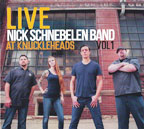 Nick
Schnebelen Band
Nick
Schnebelen Band
Live at Knuckleheads
VizzTone 2016
Nick Schnebelen won the Albert King Award as best guitarist at the Blues
Foundation’s 2008 International Blues Challenge. Check out this
album and you will know why.
Nick’s former band, Trampled Under Foot, a trio with drummer brother
Chris and bassist sister Danielle, won the 2008 IBC and blazed a path
through the contemporary blues world until disbanding about two years
ago; news flash, TUF is back together as of this writing. Meanwhile, Nick’s
foray with his own band, as exemplified by this performance at one of
their home venues in Kansas City, must be deemed a success. This CD seethes
with hot guitar licks, gritty singing, and insistent rhythmic drive.
Leading off is “I’m Goin’,” a rocker featuring
Nick and rhythm guitarist Heather Newman on dual vocals, anchored by Cliff
Moore on bass and Joey Voye on percussion. Don’t sit down yet; “Willie
James” is another rocker. The ensuing “Crazy” is reminiscent
of Ann and Nancy Wilson’s classic Heart tune, “Crazy for You,”
and leads into “Desperate Heart,” which slows the tempo. In
my opinion, the best guitarists shine most on slow tunes, and Nick absolutely
nails it here, equaling the efforts of some of my favorites at slow blues:
Coco Montoya, Ronnie Earl, Chris Vachon of Roomful of Blues, and the late
Michael Burks.
“Break of Day” allows Nick to stretch on vocal in a twelve-bar
song sounding suspiciously like the Butterfield Blues Band’s “Walking
Blues” with different lyrics, and he continues to wail convincingly
on “Bad Disposition.” Newman resumes vocal duty on “Tailgate
Swing,” a humorous automobile metaphoric lament that she can’t
prevent her rump from rotating. Demonstrating versatility, the band segues
into “Who Will Comfort Me,” a quasi-spiritual track and one
of the album’s highlights. Schnebelen and Newman then share vocals
on a version of “Spoonful” which would make Howlin’
Wolf do a double-take and then smile broadly.
The only instrumental is “Sleep Walk,” which deploys twangy
1950s-style guitar, leading into another highlight, the mid-tempo country
rocker “Jolene,” with Newman crooning to the titular femme
fatale, “Don’t take my man,” as Nick plays a lead worthy
of Mark Knopfler. The set concludes with another rocker, “New Orleans,”
featuring Nick on slide guitar.
There are no useful liner notes with the CD, but production values are
excellent, the songs provide variety, and the guitar virtuosity is top
notch. What’s not to like?—Steve Daniels
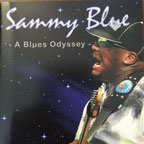 Sammy
Blue
Sammy
Blue
A Blues Odyssey
HotTrax Records www.hottrax.com
Sammy Blue has been living the blues for more 60 years. With his newest
recording “A Blues Odyssey” it’s taken two discs, an
acoustic Blues and Americana side as well as a modern electric Blues side
to fully represent his eclectic nature. This is recorded with a variety
of side men, he uses several different voices and many on the acoustic
side are recorded live.
On the acoustic side, most of the tunes feature Sammy plays solo guitar
and his vocals falls between Taj Mahal and Robert Plant. He declares his
baby is a “Holy Roller” then discloses that “I’ve
Been Fooled.” With a guttural growl Sammy begs “Come On Baby”
then inquires what does a “Modern Woman” need? He then turns
reflective on “Disposable Love” but with joyful exuberance
declares “I’ve Been Hopin’” you’ll leave
me alone. The audience joins in clapping as he asserts you’ve got
a “Reason To Live” even if you don’t know why. Still
keeping it acoustic Sammy is joined on a few tunes for some old time Americana
with Travis Biggs on violin for a lovely instrumental called “Selam’s
Song” while piano and drums are added in a sultry duet for “Everythang
& Mo.” Dr. Dixon joins him on harmonica as Sammy growls “You
Win Again” and with simple percussion and warbling harmonica Sammy
asks would you “Ever Love” again?
The electric side kicks in with a Southern Soul sound of “I Got
To Have My Way” leading into the old school slide of “I Miss
You Baby” and “Riverside” has heavy harp joining that
slide. He goes up town with a touch of Johnny ‘Guitar’ Watson
on “Watch Out!” then “Spice In My Life” has a
New Orleans groove. Sammy is rockin’ on “Dancing In The Moonlight”
while “If I Knew Then” reminds us of Nick Gravenites and “Whole
World Blues” is a rocker playing off “Let’s Work Together.”
A short intro titled “Every Musician’s Lie” leads into
an Elmore slide and the band chanting I’ll get a “Day Job”
for you, if I absolutely have too. The only covers on both CD’s
are a country flavored “See See Rider” and a modern rock version
of “Rock Me” baby.
This “Blues Odyssey” is an expansive journey but don’t
take our word for it, if you are a subscriber you’ll find Sammy
Blue on the upcoming Big City Rhythm and Blues CD sampler.—Roger
& Margaret White
Book
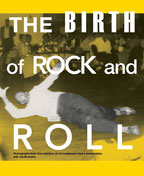 The
Birth Of Rock & Roll
The
Birth Of Rock & Roll
Jim Linderman
Dust-To-Digital www.dust-digital.com
Americana collector Jim Linderman is a resolute archivist of the obscure,
doggedly pursuing the cryptic, arcane and forgotten—check out his
various wide-ranging blogs Vintage Sleaze, Old Time Religion and Dull
Tool Dim Bulb for curios that exist solely in the shadows of mainstream
culture—who has here, in this coffee-table sized, hardback volume,
arranged a storyboard of sorts that pictorially lauds the dance-oriented,
totally abandoned spirit of rock and roll in its earliest days. And I
mean early—when a “juke joint or honky tonk with fifty patrons
was a big show, a church with fifty congregants was a full house and rootsy
bands of all sorts played square dances, rent parties, rural fields, dance
halls, living rooms, sidewalks, fish fries, county fairs, porches and
union halls,” as Linderman puts it in his scene-setting introductory
essay. Not to mention “the honky-tonk piano player, a fixture
in all the whorehouses.” What do you think rock & roll was all
about? The large page size allows the remarkably eclectic, often faded
or blurry and decidedly amateur, “found” photos to come alive
as Linderman pictorially depicts a variety of forces that resulted in
rock and roll—from “racism and subsequent integration, gospel,
blues, hillbillies, blackface minstrels, cheap Sears Silvertone guitars
(had to have a guitar), the Hawaiian music craze, burlesque, booze, weed,
the circus, vaudeville, some showtime razzle-dazzle and the spoiled generation
that followed World War Two.” He continues: “There was no
real money in it. A performer was lucky to get fed, get drunk and get
laid.” There’s no poodle skirts, Chuck Berry, Brylcream, Alan
Freed, Little Richard, white guys from Memphis or Bill Haley here. That
all came later. This is a visual narrative that tells the story from the
bottom up. A transcribed conversation between Joe Bonomo and Linderman
closes affairs on a contemplative note. Because we think our lifetimes
last a long time. They do not.—Gary von Tersch
Home
/ Blues Blogs /
Artist Links / Blues
Links / Videos / Store
Subscribe / Advertise
/ Back Issues
/ Contact / Staff